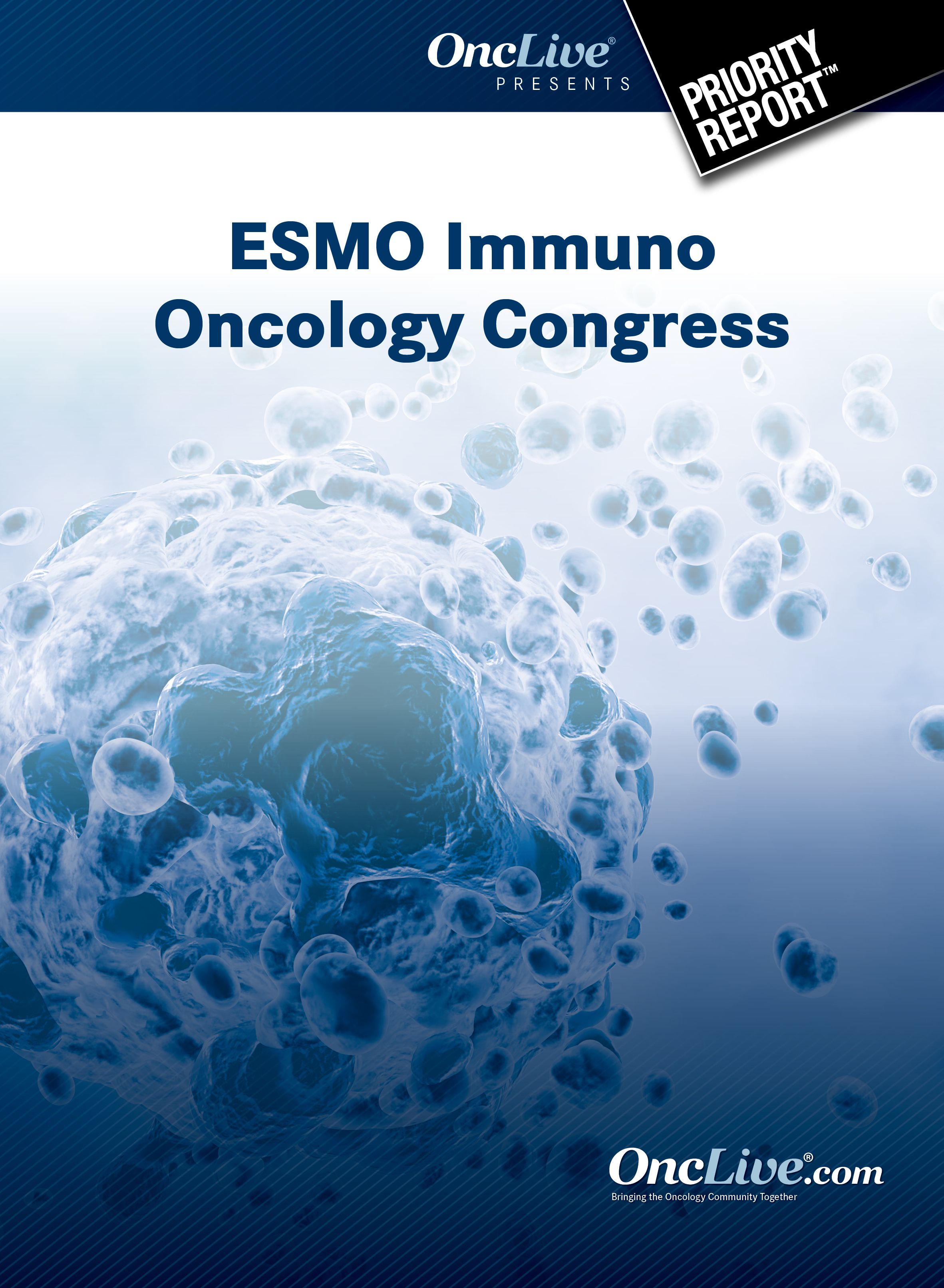BL-8040 Plus Pembrolizumab/Chemo Provides Disease Control in Pancreatic Cancer
A triplet regimen of the CXCR4 antagonist BL-8040 plus pembrolizumab and standard chemotherapy showed promising antitumor activity in the second-line setting for the treatment of patients with metastatic pancreatic ductal adenocarcinoma.
Manuel Hidalgo Medina, MD, PhD, chief of the Division of Hematology and Medical Oncology of Weill Cornell Medicine and NewYork-Presbyterian/Weill Cornell Medical Center

Manuel Hidalgo Medina, MD, PhD
A triplet regimen of the CXCR4 antagonist BL-8040 plus pembrolizumab (Keytruda) and standard chemotherapy showed promising antitumor activity in the second-line setting for the treatment of patients with metastatic pancreatic ductal adenocarcinoma (PDAC), according to phase IIa findings from the ongoing COMBAT/KEYNOTE-202 trial (NCT02826486) presented at the 2019 ESMO Immuno-Oncology Congress.1
The combination yielded a disease control rate (DCR) of 77% and an overall response rate of 32%. The best response by RECIST v1.1 criteria for the evaluable population included 7 (32%) partial responses (PRs) and 10 (45%) patients with stable disease (SD).
“These preliminary data from cohort 2 of the ongoing COMBAT study evaluating the triplet combination of BL-8040, pembrolizumab, and chemotherapy showed promising response rates and disease control,” said Manuel Hidalgo Medina, MD, PhD, chief of the Division of Hematology and Medical Oncology of Weill Cornell Medicine and NewYork-Presbyterian/Weill Cornell Medical Center.
“While PD-1/PD-L1 antagonists have shown promise across several types of cancer, they have been ineffective in patients with metastatic PDAC, who generally have a poor prognosis and few treatment options,” Hidalgo Medina added.
BL-8040 targets CXCR4 and works by altering the tumor microenvironment to promote infiltration of effector T cells and decrease the number of immune suppressor cells. In an earlier report, PD-L1 blockade had no effect in PDAC mouse models, whereas BL-8040 treatment caused an influx of T cells.2 This observation prompted the evaluation of the dual combination of BL-8040 plus pembrolizumab in cohort 1 of the open-label, multicenter COMBAT trial.
In cohort 1, results showed that the combination of BL-8040 and pembrolizumab demonstrated a 34.5% DCR in 29 patients with PDAC. A 40% reduction in tumor burden was seen in 1 patient who achieved a PR; 6 of 9 patients who achieved SD had a 1.5% to 13% reduction in tumor burden. In cohort 1, patients received the combination in the second-line setting and beyond.
When given as a second-line treatment (n = 16), the median OS was 7.5 months; for patients who received it in the second- to fifth-line setting, the median OS was 3.3 months. Additionally, biopsies from the patients achieving a response in cohort 1 showed a tumor microenvironment with increased numbers of activated CD8 T cells, decreased myeloid derived suppressor cells, and a reduction in tumor cell density.
“Therefore, the mechanism of action was demonstrated,” Hidalgo Medina commented. “The rationale for adding chemotherapy to this combination was that chemotherapy would induce cell death, thus reducing the tumor burden and also inducing immunogenic cell death; BL-8040 alters the tumor microenvironment and allows immunotherapy to kick in, and pembrolizumab maintains or restores T-cell activity in the tumor.”
The encouraging results from cohort 1, coupled with the preclinical data supporting the triplet combination, led to an expansion of the COMBAT study to include cohort 2: which evaluated the 3-drug regimen as second-line therapy in patients with PDAC.
“CXCR4 is a chemokine receptor and a validated target that is overexpressed in PDAC; overexpression correlates with poor prognosis,” said Hidalgo Medina.
The 30 patients enrolled on cohort 2 received 5 days of BL-8040 priming monotherapy followed by combination treatment of chemotherapy with irinotecan/5-fluorouracil/leucovorin every 2 weeks, pembrolizumab every 3 weeks, and BL-8040 twice weekly. Patients who were eligible for enrollment had metastatic PDAC with measurable disease by RECIST v1.1 criteria, and had progressed following frontline gemcitabine-based chemotherapy. No prior surgery or PD-1/PD-L1 therapy was permitted. More than half (57%) of patients were male, all had an ECOG PS of 0 or 1, and the median age was 68 years (range, 50-83). All patients had received 1 prior line of treatment. At the data cutoff, 22 of the 30 patients had received ≥1 dose of the triplet, received post-baseline chemotherapy, and were evaluable.
The SD rate among the 22 evaluable patients was 45%. Notably, results showed that all of the patients who achieved a PR and SD showed an initial increase in CA 19-9 followed by a decrease; tumor shrinkage was observed to begin during the transient increase in CA 19-9. Additional data showed that some patients with SD eventually converted to PR.
The safety analysis included all 30 patients in cohort 2. Any-grade adverse events (AEs) occurred in 87.5% of patients; the most common AEs were vomiting (47%), diarrhea (43%), asthenia (43%), injection site reaction (40%), nausea (40%), anemia (27%), and pruritus (27%).
Grade 3/4 AEs consisted of diarrhea (13%), asthenia (10%), vomiting (7%), decreased appetite (7%), pruritus (3%), anemia (3%) and injection site pain (3%). Two patients discontinued the study due to AEs.
“Further studies of the combination of BL-8040, pembrolizumab, and chemotherapy in pancreatic cancer, as well as other indications that are historically unresponsive to checkpoint inhibitors and/or chemotherapy, are warranted,” said Hidalgo Medina. “This study may also open the door to other immunotherapy combinations that are effective in the population of patients with metastatic PDAC.”
Session discussant and co-chair, Lawrence Fong, MD, co-director of the Parker Institute for Cancer Immunotherapy, University of California, San Francisco commented on the preliminary data.
“The 32% ORR and 77% DCR seen in the COMBAT cohort 2 compares favorably with the current standard chemotherapy,” Fong noted. “Pancreatic tumors are traditionally desmoplastic and immunologically ‘cold’ tumors; CXCR4 inhibition [plus] pembrolizumab [and] chemotherapy is showing early signs of intriguing clinical activity—stay tuned for the results with more patients,” said Fong.
References
- Hidalgo M, Semenisty V, Bockorny B et al. A multi-center phase 2a trial to assess the safety and efficacy of BL-8040 (a CXCR4 inhibitor) in combination with pembrolizumab and chemotherapy in patients with metastatic pancreatic adenocarcinoma (PDAC). Ann Oncol. 2019;30(suppl_11):xi33-xi47. doi: 10.1093/annonc/mdz451.
- Feig C, Jones JO, Kraman M et al. Targeting CXCL12 from FAP-expressing carcinoma-associated fibroblasts synergizes with anti—PD-L1 immunotherapy in pancreatic cancer. PNAS. 2013;110(50):20212-20217. doi: 10.1073/pnas.1320318110.




